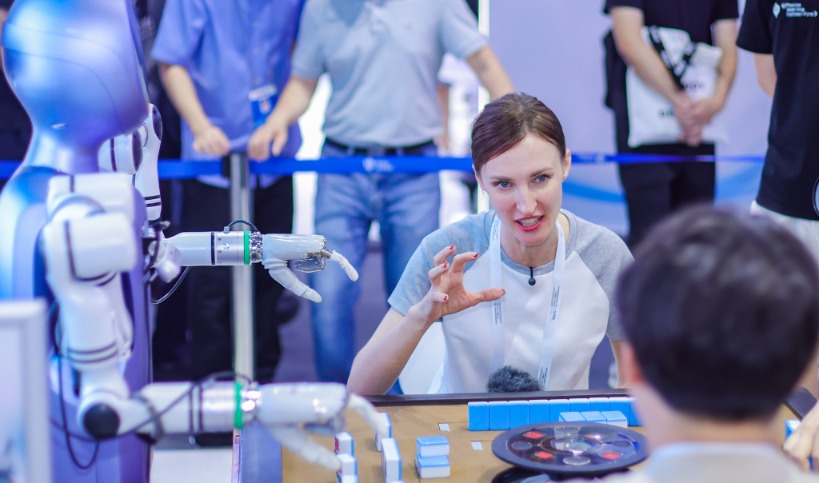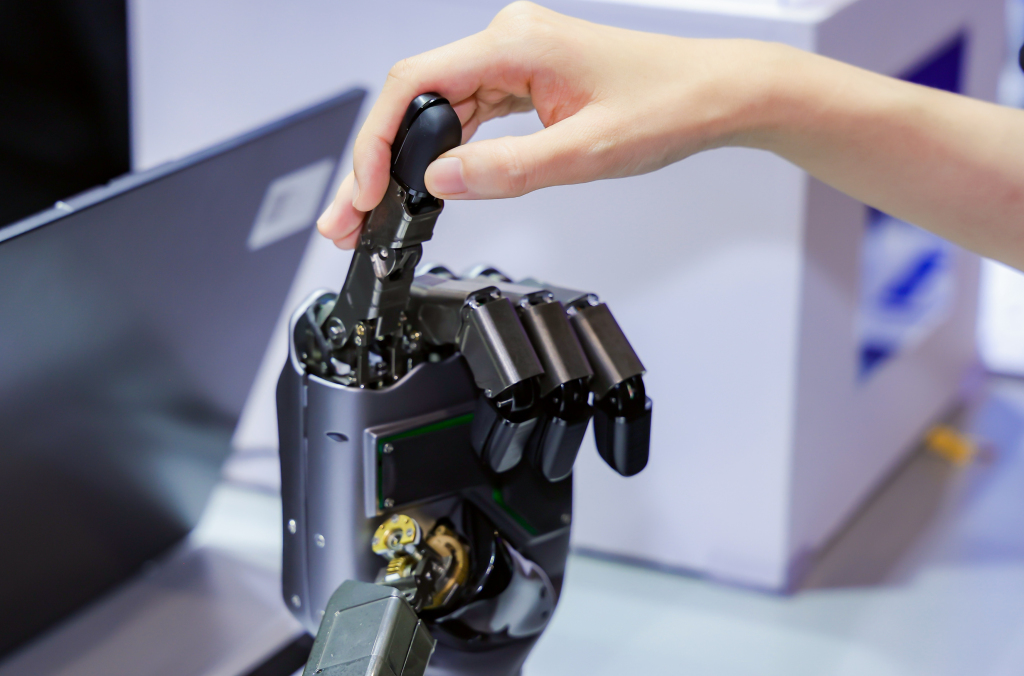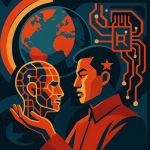Key Points
- Chen Yuanpei, a Gen Z founder, co-founded Lingchu Intelligence (灵初智能) after being mentored by “AI Godmother” Li Feifei (李飞fei) at Stanford and making the 2025 Forbes “30 Under 30 Asia Leaders” list.
- His company showcased a mahjong-playing robot at WAIC, powered by their PsiR1 model, which uses a self-developed 21-degree-of-freedom dexterous hand.
- Lingchu Intelligence quickly secured Angel funding from backers like Gaoling Capital (高瓴资本) and was accepted into NVIDIA’s Inception program.
- Chen advocates for a “golden age” in AI where “even an individual can start a business” and emphasizes the importance of a product-centric approach to prove value regardless of age.
- The company’s vision aims for a future where “everyone will have their own robot,” focusing on the critical roles of data (especially human data) and reinforcement learning in robotics.

The AI industry is buzzing with young talent, and nowhere was this more obvious than at this year’s World Artificial Intelligence Conference (WAIC).
Amidst hundreds of competing robots, one machine drew massive crowds: a robot that could play a full game of mahjong.
What most people queuing for a game didn’t know is that the brain behind this bot is an entrepreneur born after the year 2000.
From WAIC Spectator to a Forbes ’30 Under 30′ Star
Meet Chen Yuanpei (Chen Yuanpei 陈源培), the co-founder of Lingchu Intelligence (Lingchu Zhinei 灵初智能).
His resume is nothing short of stacked.
He was mentored by Yang Yaodong (Yang Yaodong 杨耀东), a major figure in reinforcement learning (RL) at Peking University.
He then studied under “AI Godmother” Li Feifei (Li Feifei 李飞飞) and Karen Liu as a visiting scholar at Stanford.
While at Stanford, Chen proposed the Psi-CO model.
This was a breakthrough, becoming the first model globally to achieve simultaneous control of dual arms and hands for multi-skill operations in the real world using reinforcement learning.
This work landed him on the prestigious 2025 Forbes “30 Under 30 Asia Leaders” list.
At the WAIC, he told reporters he was a spectator just a few years ago. Now, he’s a main-stage exhibitor.
He designed the interactive mahjong and cyber fortune-telling experiences specifically to give people a tangible feel for his company’s tech.

Find Top Talent on China's Leading Networks
- Post Across China's Job Sites from $299 / role
- Qualified Applicant Bundles
- One Central Candidate Hub
Your First Job Post Use Checkout Code 'Fresh20'


ExpatInvest China
Grow Your RMB in China:
- Invest Your RMB Locally
- Buy & Sell Online in CN¥
- No Lock-In Periods
- English Service & Data
- Start with Only ¥1,000

Building Lingchu Intelligence with Heavy-Hitter Backing
In 2024, Chen co-founded Lingchu Intelligence.
The company quickly secured an impressive Angel funding round. Backers include:
- Gaoling Capital (Gaoling Ziben 高瓴资本)
- BlueRun Ventures (Lanchi Chuangtou 蓝驰创投)
- Zhiyuan Robotics (Zhiyuan Jiqiren 智元机器人), the company founded by China’s famous tech influencer Zhihui Jun (Zhihui Jun 稚晖君).
Soon after, Lingchu Intelligence was accepted into NVIDIA’s prestigious Inception program, a huge vote of confidence from the world’s leading AI chipmaker.
The company’s core tech includes its hierarchical end-to-end reinforcement learning models PsiRO, RO.5, and R1, along with a self-developed 21-degree-of-freedom dexterous hand.
The mahjong robot that wowed the crowds? That was running on their PsiR1 model.
When asked why he got into dexterous hands, Chen’s answer was refreshingly simple: “I started researching this during my freshman and sophomore years… I was just very interested, and dexterous hands looked incredibly cool, so I kept at it.”

Resume Captain
Your AI Career Toolkit:
- AI Resume Optimization
- Custom Cover Letters
- LinkedIn Profile Boost
- Interview Question Prep
- Salary Negotiation Agent

“If You’re Strong and Fast Enough, Now Is a Very Good Opportunity”
Why jump from academia to the brutal world of startups?
Chen said after years of research, he wanted to enter the industry “to create products that can truly change the world.”
He believes the current AI era is a golden age for young builders.
“AI is developing rapidly, and there’s no hierarchy based on seniority. Any breakthrough has the potential for disruptive impact,” he stated.
He argues that timing is everything.
“Fields like biology and chemistry in the past truly required accumulated experience before considering entrepreneurship. But AI is different; even an individual can start a business.”
“You need to dare to think and act. Now is a great opportunity. As long as you are strong enough and can learn fast enough, what you create is likely to be better than others’.”

Tapping the “China Advantage” for AI Hardware and Innovation
Chen is also bullish on China’s AI startup ecosystem.
“China’s hardware, supply chain, and manufacturing advantages are undeniable, and the domestic innovation atmosphere is also improving.”
He points to Shanghai as a prime example, noting the city’s “substantial support for AI development” has created a hotbed for top labs and companies.
His philosophy on team building is also shaped by the AI age.
He believes the core asset in AI is “Know-How (methodology).”
While larger teams used to signal strength, AI tools have enabled the rise of “one-person companies.”
“Personally, I prefer to focus on smaller teams with extremely strong capabilities. In the age of AI, it’s more about whether a team has combat effectiveness.”

“What Truly Proves You Is The Product”
Being a young founder isn’t without its challenges.
Chen admits that while most investors are impressed by his research and products, some remain skeptical of his age.
His response is direct and focused.
“For me, it still comes down to results… What truly proves you is your product, and how many people are willing to pay for it.”


The Grand Vision: A Robot For Everyone and OpenAI-Level Impact
- Hierarchical End-to-End Reinforcement Learning Models: PsiRO, RO.5, and R1.
- Self-Developed Hardware: A 21-degree-of-freedom dexterous hand.
- Mahjong Robot Application: The PsiR1 model specifically powers their showcased mahjong-playing robot.
- Product-Centric Approach: “What truly proves you is your product, and how many people are willing to pay for it.”
- Timing is Key: The current AI era is a “golden age” where breakthroughs can have disruptive impact regardless of seniority.
- Individual Entrepreneurship: Unlike traditional fields, AI allows “even an individual to start a business.”
- Know-How over Team Size: Prefers “smaller teams with extremely strong capabilities” focused on “combat effectiveness.”
Chen’s goals are anything but small.
From a company perspective, he hopes that “everyone will have their own robot in the future.”
His personal ambition is even bigger.
“Short-term success is not true success. Real success needs to reach the level of companies like ByteDance (Zijiexitong 字节跳动) or Alibaba (Alibaba 阿里巴巴). It’s hard to say, perhaps even achieving something like OpenAI is possible.”

The Twin Pillars of Robotic Success: Data and Technology
So, how do you get there? Chen says it boils down to two things: data and technology.
1. The Data Challenge
This is the big one. “Data has always been a huge challenge in the robotics field.”
- Data collected only from real robots is never enough, especially for consumer-facing products.
- Simulated environments help, but they can’t cover every object and scenario in the real world.
- To get the massive amount of data needed, Chen believes you must rely on human data.
This is precisely why Lingchu Intelligence built a five-fingered hand. It’s closer to a human hand, which shrinks the data gap and makes it easier to learn from human actions.
2. The Technology Edge
Collecting data is only half the battle. Using reinforcement learning to train the model and improve its success rate is critical.
The Lingchu team has deep expertise here, which is essential for complex, long-range tasks like a full game of mahjong.

The Future is Embodied: Why AI Needs a Body
Looking ahead, Chen is firm in his belief that the future of AI is physical.
“Pure, disembodied intelligence… is at most an auxiliary tool; it’s difficult for it to independently enhance productivity.”
“To change the world, you need to create more things.”
He also notes that today’s language and vision models aren’t enough.
Truly intelligent systems will need multimodality—integrating tactile (touch) and auditory (hearing) senses to navigate the world.
Human-level intelligence in a physical form is the end game, and with a new generation of founders like Chen Yuanpei, the future of the AI industry is proving to be as dexterous and fast-moving as the robots it creates.


![Small Nuclear Reactors & Data Centers: Why China is Leading the Charge [FreshFromChina]](https://freshfromchina.com/wp-content/uploads/2025/05/Small-Nuclear-Reactors-Data-Centers-Why-China-is-Leading-the-Charge___FreshFromChina-150x150.png)


